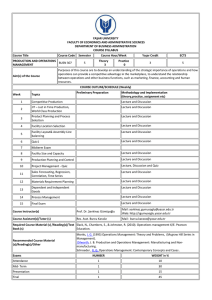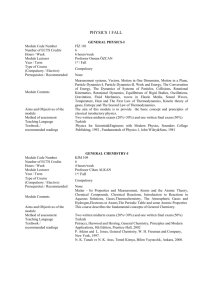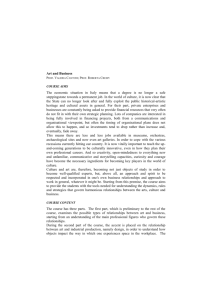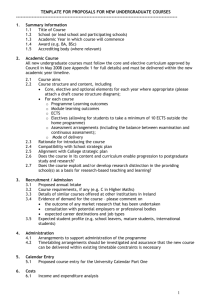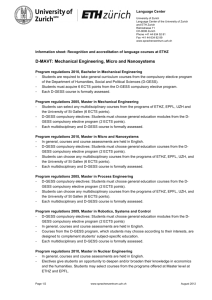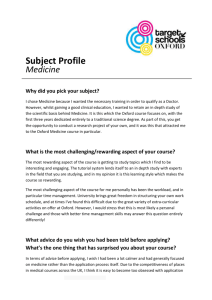European Integration Process
advertisement
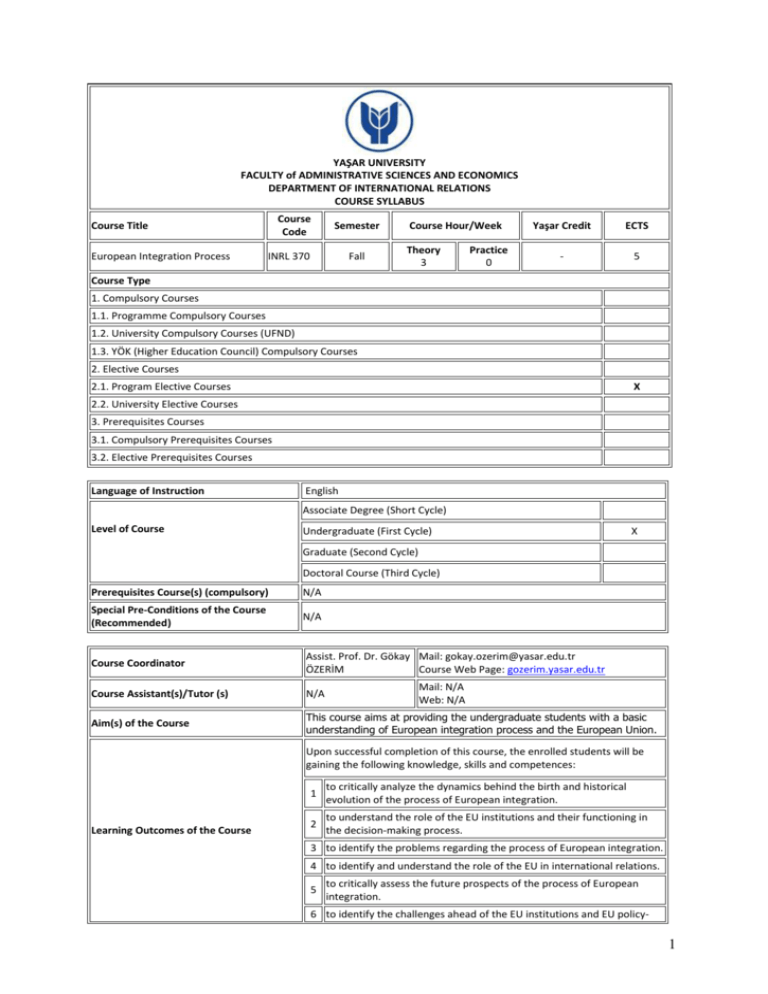
YAŞAR UNIVERSITY FACULTY of ADMINISTRATIVE SCIENCES AND ECONOMICS DEPARTMENT OF INTERNATIONAL RELATIONS COURSE SYLLABUS Course Code Course Title European Integration Process Semester INRL 370 Fall Course Hour/Week Theory 3 Practice 0 Yaşar Credit ECTS - 5 Course Type 1. Compulsory Courses 1.1. Programme Compulsory Courses 1.2. University Compulsory Courses (UFND) 1.3. YÖK (Higher Education Council) Compulsory Courses 2. Elective Courses 2.1. Program Elective Courses X 2.2. University Elective Courses 3. Prerequisites Courses 3.1. Compulsory Prerequisites Courses 3.2. Elective Prerequisites Courses Language of Instruction English Associate Degree (Short Cycle) Level of Course Undergraduate (First Cycle) X Graduate (Second Cycle) Doctoral Course (Third Cycle) Prerequisites Course(s) (compulsory) N/A Special Pre-Conditions of the Course (Recommended) N/A Course Coordinator Assist. Prof. Dr. Gökay Mail: gokay.ozerim@yasar.edu.tr ÖZERİM Course Web Page: gozerim.yasar.edu.tr Course Assistant(s)/Tutor (s) N/A Aim(s) of the Course This course aims at providing the undergraduate students with a basic understanding of European integration process and the European Union. Mail: N/A Web: N/A Upon successful completion of this course, the enrolled students will be gaining the following knowledge, skills and competences: Learning Outcomes of the Course 1 to critically analyze the dynamics behind the birth and historical evolution of the process of European integration. 2 to understand the role of the EU institutions and their functioning in the decision-making process. 3 to identify the problems regarding the process of European integration. 4 to identify and understand the role of the EU in international relations. 5 to critically assess the future prospects of the process of European integration. 6 to identify the challenges ahead of the EU institutions and EU policy- 1 making. The course will analyse the historical evolution of European economic and political integration, theories of European integration and the institutions of European economic and political integration. Course Content Methodology and Implementation (Theory, practice, assignment etc.) Week Topics 1 Introduction: The Origins of European Integration Module I: Theory Module II: Theory and Group Discussion 2 The Origins of European Integration II Module I: Theory Module II: Group Discussion 3 Theories of European Integration Module I: Theory Module II: Group Discussion & Case Study 4 Enlargement of the EU Module I: Theory Module II: Group Discussion &Case Study 5 Deepening of the EU: Institutions Module I: Theory Module II: Group Discussion 6 Treaties of the EU Module I: Theory Module II: Group Discussion 7 Midterm Exam Midterm Exam 8 Policies: EU Security and Defense Policy Module I: Theory Module II: Group Discussion & Case study 9 Policies: EU Immigration Policy Module I: Theory Module II: Movie Session and Discussion 10 Policies: Common Foreign Policy Module I: Theory Module II: Text Analysis and Group Discussion 11 Customs Union and Common Commercial Policy Module I: Theory Module II: Group Workshops 12 Values and Objectives of the EU Module I: Theory Module II: Group Workshops 13 Lisbon and the Future of EU Module I: Theory Module II: Group Workshops 14 General Overview of the Course Group Discussion 15 Final Exam Final Exam Course Text Book: Dinan, D. (2010). “Ever Closer Union: An Introduction to European Integration”. Palgrave Macmillan. W. Churchill, “The Tragedy of Europe” in Brent N. and A. Stubb. The European Union. London: Lynne Reinner. 1994. pp. 1-5. C. De Gaulle, “A Concert of European States”, in Brent, pp. 25-43. Required Course Material (s) /Reading(s)/Text Book (s) Ian Manners, “The Normative Power of the European Union in a Globalized World,” in Zaki Laidi ed. EU Foreign Policy in a Globalized World, London and New York: Routledge, 2008, pp. 23-37. D. Mitrany, “ A Working Peace System”, in Brent, pp. 77-99. Helen Wallace, “An Institutional Anatomy of Five Policy Models,” in Helen Wallace et al eds. PolicyMaking in the European Union, Oxford: Oxford University Press, 2005.), pp. 49-77. Michelle Egan, “The Single Market” in Michelle Cini ed. European Union Politics, Oxford: Oxford University Press, 2005, ch. 3. Jean Wouters, Luc Verhey and Philip Kiiver, “European Constitutionalism Beyond Lisbon: Introductory Remarks,” in Jean Wouters et al. European Constitutionalism beyond Lisbon, (Antwerb: 2 Intersentia, 2009), pp.1-13. Websites-Online Resources European Union Institutions: http://www.europarl.europa.eu/addresses/institutions/websites.htm European Website on Integration: https://ec.europa.eu/migrant-integration/home European Integration History Index: http://vlib.iue.it/hist-eur-integration/Index.html European Integration Online Papers: http://eiop.or.at/eiop/vols_1997_2015.html Historical Documents: http://www.hum.leiden.edu/history/eu-history/historical/ News: https://euobserver.com http://www.euractiv.com European Studies Institutes and Centers: http://councilforeuropeanstudies.org/resources/institutes-centers J. McCormick, Understanding the European Union. New York: Palgrave, 1999 and 2002, pp. 1-18. Kaya, A. et al. “ Avrupa Birliği’ne Giriş: Tarih, Kurumlar ve Politikalar. İstanbul Bilgi Üniversitesi Yayınları. 2011. Recommended Course Material (s) Marcus Jachtenfuchs, “The European Union as a Polity II” in Knud Erik Jorgensen et al. Handbook of /Reading(s)/Text European Union Politics, London, Sage: 2006, pp. 159-173. Book (s) W. Wallace, “ ‘Foreign and Security Policy’” in Helen Wallace, William Wallace and Mark A. Pollack eds. Policy-Making in the European Union, Oxford: Oxford University Press, 2005.), pp. 429-456. ASSESSMENT Semester Activities/ Studies NUMBER WEIGHT in % Mid- Term 1 40 Attendance - - Quiz 5 10 Assignment (s) - - Project - - Laboratory - - Field Studies (Technical Visits) - - Presentation/ Seminar - - Practice (Laboratory, Virtual Court, Studio Studies etc.) - - Other (Placement/Internship etc.) - - Contribution of Final Examination/Final Project/ Dissertation to the Final Grade TOTAL 50 . 100 3 CONTRIBUTION OF LEARNING OUTCOMES TO PROGRAMME OUTCOMES Level of Contribution (1lowest/ 5- highest) N Programme Outcomes o 1 2 3 4 . To identify and interpret the roles of the basic actors and institutions, and outcomes and 1 externalities of the relevant processes and conditions in domestic as well as foreign policy making 5 X 2 To explain and analyze the historical developments that laid the foundations of modern interstate relations X 3 To identify, explain and analyze the current political, social, legal and economic fundamentals of international relations X 4 To define, analyze and criticise the judgments about the governing normative and moral premises of international relations X To use theoretical perspectives and case-oriented knowledge that facilitate analytical thinking 5 while formulating solutions about the problems with organizational, local, national, international and global dimensions X 6 To participate actively interdisciplinary and in-disciplinary and studies and activities that require team work 7 To expose opinion leader characteristic with scientific scepticism, objectivity and diligence in every sort of social environment 8 To demonstrate appropriate behaviours in all aspects of social life with the prevailed basics of ethics and morals X 9 To use the skills of written and oral communication in English with a competency in a second foreign language and to employ them in all kinds of international and local working environments X X X 10 To embrace the understanding and culture of life-long learning 11 To find, refine, reproduce, use and disseminate knowledge by making use of Information Technologies (IT) ECTS /STUDENT WORKLOAD NUMBER UNIT HOUR TOTAL (WORKLOAD) Course Teaching Hour (13 weeks* total course hours) 13 Week 3 39 Preliminary Preparation and finalizing of course notes, further self- study 15 2 30 Assignment (s) 4 Number 2 8 Presentation/ Seminars - Number - - Quiz and Preparation for the Quiz 5 Number 1 5 Mid- Term(s) 1 Number 15 15 Project (s) - Number - - Field Studies (Technical Visits, Investigate Visit etc.) - Number - - Practice (Laboratory, Virtual Court, Studio Studies etc.) - Number - - Final Examination 1 Number 25 25 Other (Placement/Internship etc.) - Number ACTIVITIES Week Total Workload 122 Total Workload/ 25 4.88 ECTS 5 4 ETHICAL RULES WITH REGARD TO THE COURSE (IF AVAILABLE) All students enrolled to the course are required: To come to the class with a good preparation. To prepare and present assignments on time. To participate class discussions actively. ASSESSMENT and EVALUATION METHODS: Final grades and assessment criteria are determined according to Yasar University Associate Degree, Bachelor Degree and Graduate Degree Education and Examination Regulation. The exams are assessed on the basis of letter grades. PREPARED BY UPDATED APPROVED Yrd.Doç .Dr. Gökay ÖZERİM 01.09.2015 01.09.2015 5
